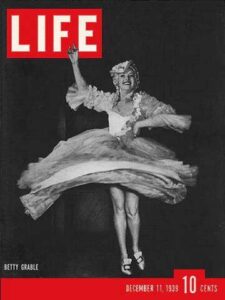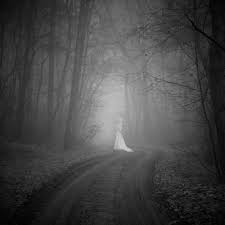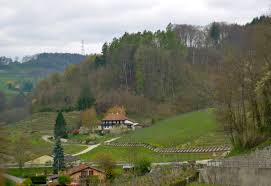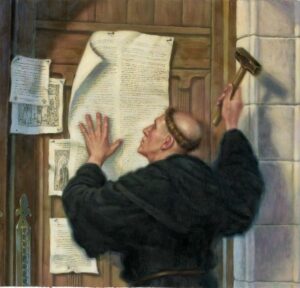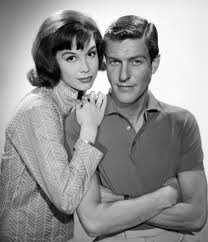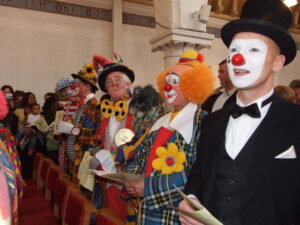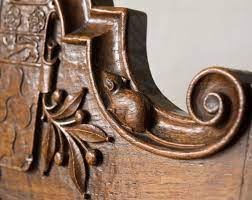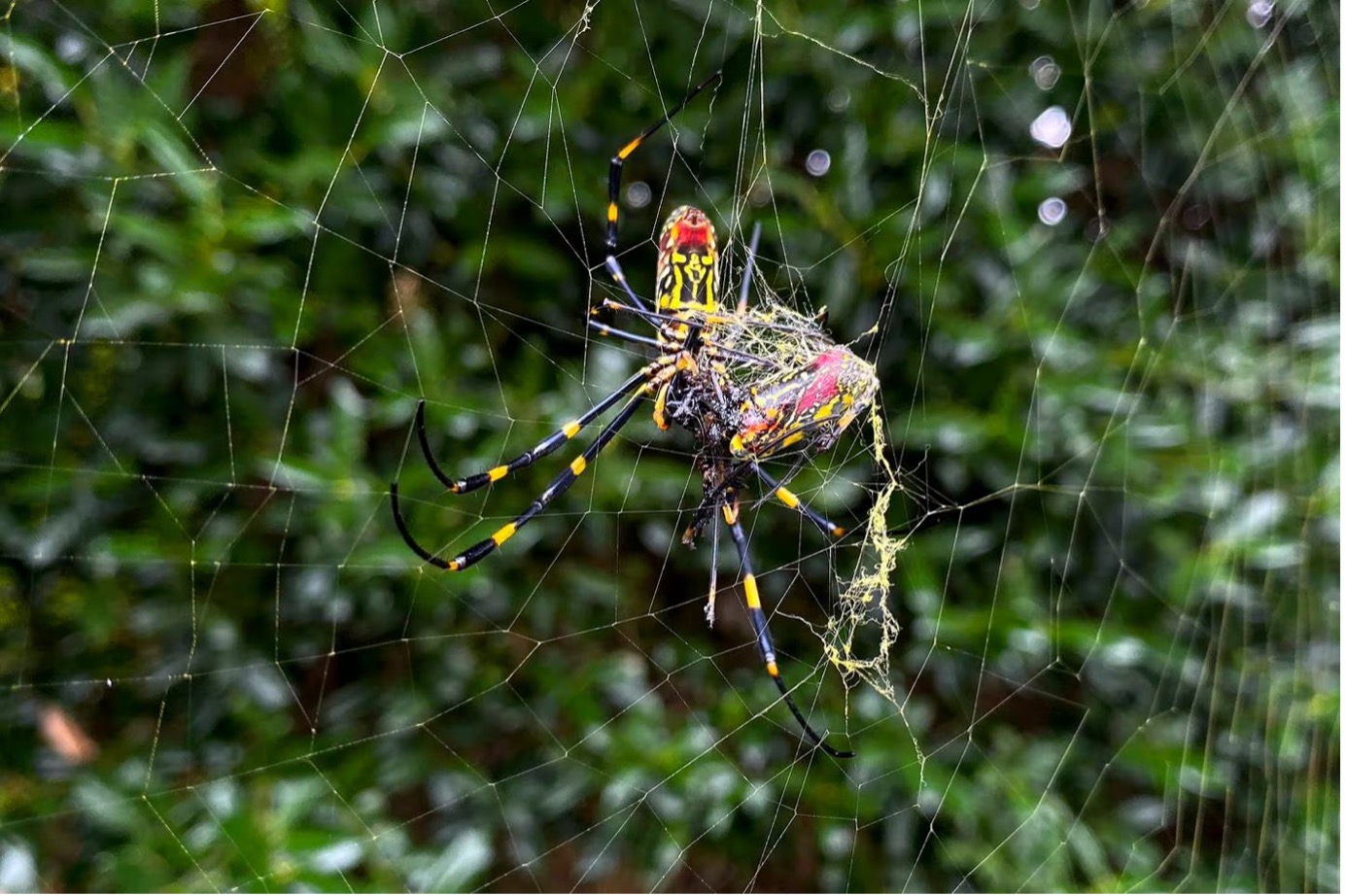
People like the sensational and fearful. The Joba spider a big spider, it’s colourful, and it’s venomous. Spiders induce fear and fear is kind of interesting … so this spider kind of fits that and generates some publicity.
My attention was attracted to this very large spider, which is related to the golden orb variety that hangs around our garden and on occasions drapes its web across our pathway, so the spider can end up on clothing. The spider does not worry me so long as it does not negotiate my collar and have a tour of my back.
The Joba Spider has hitchhiked from South-east Asia to the East Coast of the United States and is threatening to take out the native spiders. It is stated to be venomous which immediately inflames the arachnid phobic brain; but reading further for humans and for that matters animals, its bite is no more venomous than that of a mosquito, its bite causing local redness and itch. In any event, the spiders are shy, and avoid human contact as much as possible. But invaders invoke a sense of dread – and myth!
In our microenvironment, called home, we have learnt to live with spiders of various sizes – not in harmony necessarily, but that is the legacy of living in a semi-tropical environment where corners are left as havens for insects and spiders. There are the St Andrew’s Cross spiders, their spindly configuration suggestive of the crucifixion of the Apostle strung in the centre of their steel grey web. When disturbed, these spiders shake their webs, emitting flashes of yellow or brown depending on the sex of the spider.
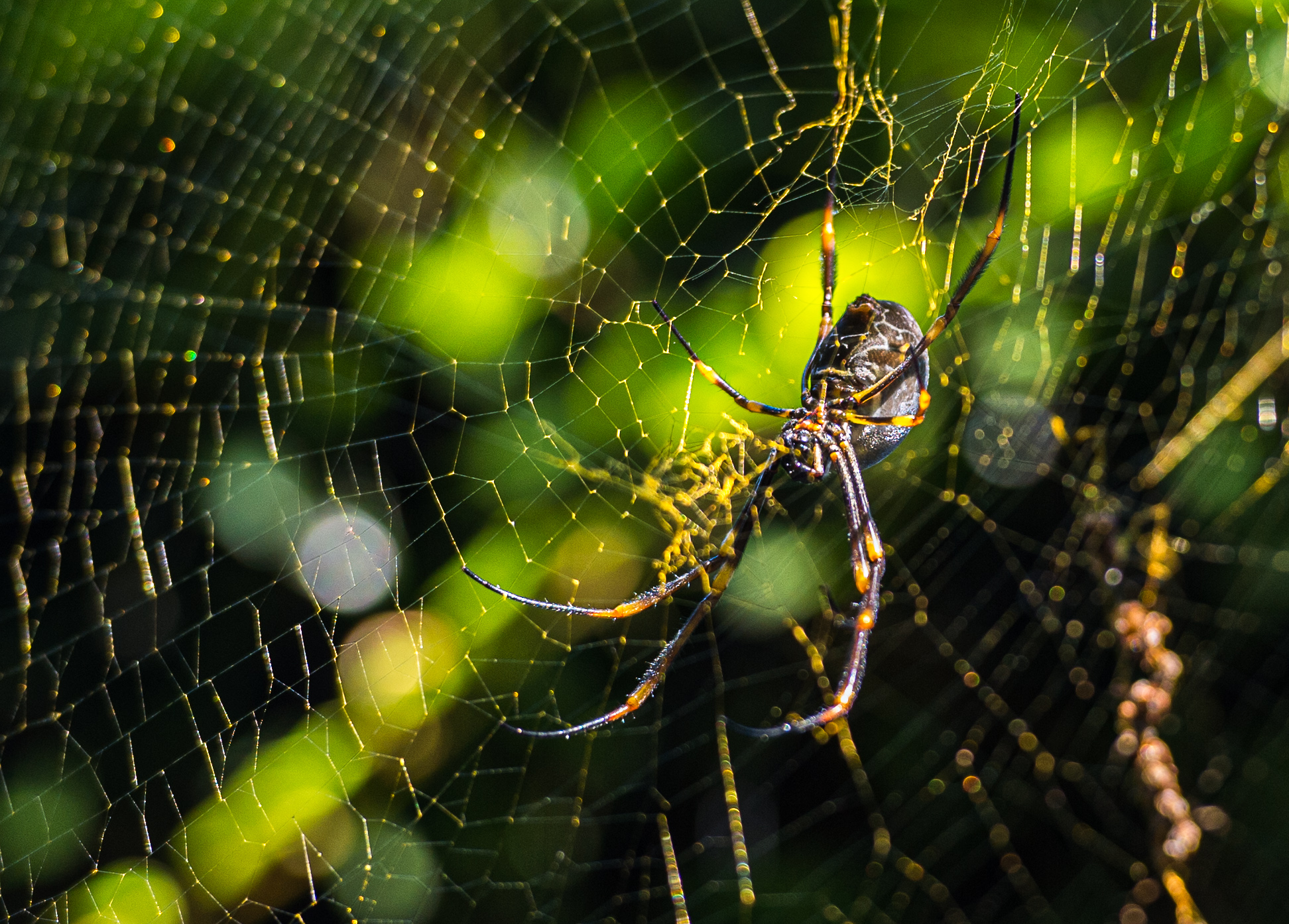
Then there are those golden orbs waiting to entrap the unwary as they extend their web across the path from one Japanese maple to the other. Their abdomens glistening yellow in the early morning dew – no problem as long as you know where they are and not camouflaged in the foliage. Their spun silk is so strong that the fibre has been woven into a shawl.
However, the ones which evoke horror from persons not used to having them attached to the ceiling are the huge, hairy huntsman spiders which, to the devotees of the horror movie, have tarantula-type proportions. For a time, there was a nest somewhere in our garage behind all the detritus accumulated over thirty years we have lived there.
They appear suddenly, but generally ours prefer the open spaces of the ceilings and walls, bathrooms an area they particularly haunt. The guest bedroom generally helped the level of adrenaline when one huntsman was a silent yet menacing witness to the human life below. When they move, huntsmen spiders move incredibly fast, crabbing their way across the wide-open prairie of the ceiling, pursued when I was capable by myself with a broom. The straw entangled them, and held high, I then marched out into the garden and pitched them away. Once the huntsman vanished over the fence, there was a squeal and I was back inside, sans balai. Huntsmen spiders undisturbed live for two years; they have a nasty bite, but you have to be completely stupid or very unlucky to be bitten.
They are not life threatening unlike the Sydney Funnel Web spiders, which have a neurotoxin which can kill in quick order, unless one is given the antivenene. The last known death from a funnel web spider bite was in 1979, a year before the antivenene came onto the market. Still, since bites are rare and unless you know that a black spider has bitten you, and you don’t apply a pressure bandage and you think one can outlast the increasingly severe symptoms, then there will be an inevitable fatality. As a child coming to Sydney, I knew about funnel web spiders very early on, with their predilection for sandy soils. It made me very wary, even as a young child, of grubbing around in the gardens of Sydney.
The same could be said of red back spiders, the bane of the outside toilet. Always checked the toilet seat and underneath for these spiders, which always have been the stuff of comedy, “biting the bum” jokes. However, before the antivenene became available in 1956, there had been fourteen deaths attributed to the red back spider neurotoxin. None since, except a young fellow died eight years ago from an alleged red back bite. The visible red stripe on their backs provide these small black spiders with the identification characteristic. Always took a torch to the “outside dunny”, which proved, I might say, very useful on a few occasions.
Nevertheless, I am very wary of all black spiders no matter the size because once, when walking through the bush in Ku-ring-gai Chase National Park, I brushed against a bush, and received an almightily painful bite from a tiny black spider, which I did not recognise since, having “done its dastardly deed”, it rapidly disappeared into the undergrowth. Boy, did I suffer, despite putting the affected finger in cold water from a convenient nearby stream.
Okay there were always the trapdoor spiders, which we kids loved irritating by disturbing their “trapdoors” with blades of grass, so they would emerge as tiny pugilists; good spider-sadistic fun. But then the gardens became lawn and the trapdoor spiders were buried under horticultural progress.
 So there you are, it started with a reflection on the Joba “spider wars”; and ended up in my reminiscing of a time when you could always buy “a spider” at the local milk bar. I used to love them!
So there you are, it started with a reflection on the Joba “spider wars”; and ended up in my reminiscing of a time when you could always buy “a spider” at the local milk bar. I used to love them!
Coulrophobia
Bring out the grease paint, the red noses, the baggy pants, the shapeless footwear, the Congress Clowns are back in town. Needless to say, three Democratic Congressmen joined in the merriment. Gerry Connolly of Virginia, Jared Moskowitz of Florida and John Garamendi of California introduced a bill to rename the Miami Federal Correctional Institution to the “Donald J. Trump Federal Correctional Institution”. This resolution was deemed to recognise the 34 convictions that the Felonious Trump had scored and played in New York.
The House GOP has been hard at work for the past couple of weeks. In fact, this is the most legislation they’ve introduced in a while. If they were capable of thinking about anything but the orange convict, we might actually call this past week… productive? But come on, we all know that’s not possible. The very thought of passing something the American people could actually use probably makes members like MTG and Matt Gaetz break out in hives.
 So, instead, they went with the usual pointless crap that is both ridiculous and could never pass the House anyways with their razor thin majority that seems to be shrinking by the day. We must say though, this set of bills is the most blatant form of orange-nosing we’ve seen yet. In addition to naming Dulles Airport after the convict, they want to name an area of water surrounding Florida the “Donald John Trump Exclusive Economic Zone of the United States.” And the cherry on top? Not only does the House GOP want to bring back the $500 bill, but they want to put a portrait of Trump on the front of it. Lincoln Project
So, instead, they went with the usual pointless crap that is both ridiculous and could never pass the House anyways with their razor thin majority that seems to be shrinking by the day. We must say though, this set of bills is the most blatant form of orange-nosing we’ve seen yet. In addition to naming Dulles Airport after the convict, they want to name an area of water surrounding Florida the “Donald John Trump Exclusive Economic Zone of the United States.” And the cherry on top? Not only does the House GOP want to bring back the $500 bill, but they want to put a portrait of Trump on the front of it. Lincoln Project
On hearing Samuel Barber’s Adagio for Strings Op11
My time in Vietnam ended in 1971. My memories are sadly as fresh today as they were 53 years ago. Those of us who served in that conflict will never forget what we saw, heard, smelled, tasted, and endured at such an impressionable age in our lives. Weep as I do hearing this musical arrangement, I am moved beyond words by this tribute to all who served and died on both sides of that war. They say that with age comes wisdom and understanding. Now in my seventies, I have gained much wisdom, but to this day I will never understand the need for the horrors inflicted upon the living and dead of that war.
I served in the US Army from 1969 to 1971. The feelings for each person who served in that period can’t be explained to those who never went through it. A number of years later I visited the Viet Nam memorial in Washington DC with full knowledge that I could just as easily have been one of the names carved into the stone wall. I should have felt lucky to still have been alive but all I could feel was sadness about the thousands of dead and shattered lives destroyed by that useless war. All I could do was break into tears. I left, and never went back.

The above two blogs were written apparently in response to hearing this beautiful music which counterpointed the inhumanity portrayed in the film about the Vietnam War – “Platoon”. The Adagio in this instance was played by a Polish youth orchestra. Watching these young violinists, violists, cellists and bass players, I wondered how many of their ancestors had been slaughtered during WWII when six million Poles perished – over 21 per cent of the then population.
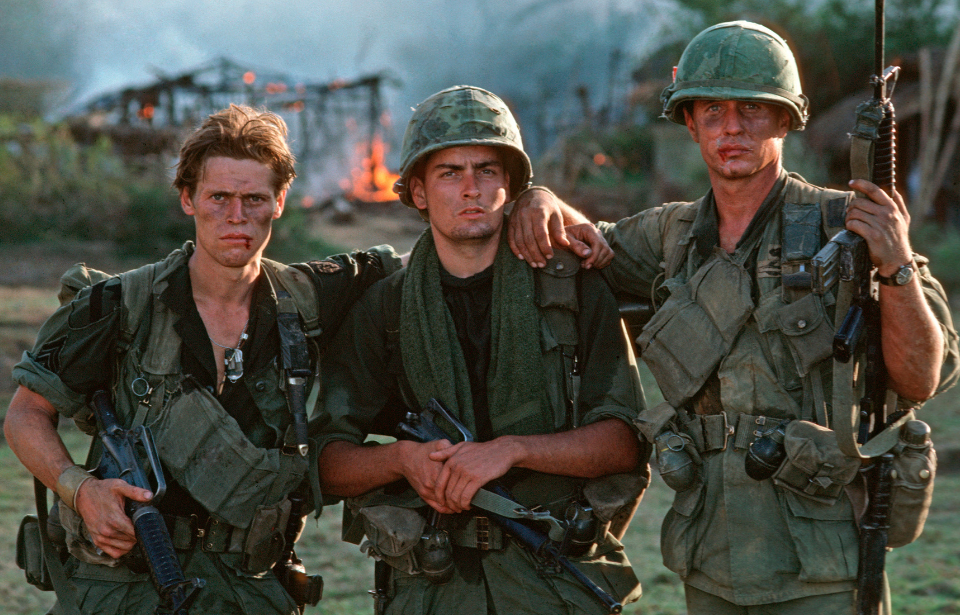
War films can be nonsense, as in the John Wayne and Sylvester Stallone representations of the carnage of war. In particular, John Wayne was a grotesque figure in his portrayal of the war hero. I always thought that Wayne never got over being christened “Marion Morrison”. Still, he was revered as the Western hero, the creation of John Ford, in fourteen films spread over 23 years.
WWII was the set of comic book heroes. Nobody in my family was killed; thus I knew no death until my Aunt Mildred passed away just after the War. I was left with some anonymous person while everybody trooped off in black to bury Mildred.
The Korean war was hardly mentioned, but Anzac Day was a different matter. We small boys had to stand while the names of all those from the school who had died in both World Wars were read out. I well remember when the headmaster got to the “Snowball” brothers, the end of the list was nigh, and we could begin shuffling and raising our collective bowed heads.
Cadet service was compulsory, and since I looked intrinsically slovenly, found boot shining tedious and had perpetually unruly gaiters straps, I was not the epitome of the immaculate cadet. Proud never to be promoted.
However, as medical students, we came upon many doctors who taught us and had served as medical officers; many had been prisoners-of-war. They never talked about the war. I remember the story of the returned serviceman, who always dined alone on Christmas Day in memory of a mate who had been killed on that day.
It was only with the Vietnam War, that I became seriously involved in observing the destructive elements of war. By that time, I had spent two years in the dissecting room and, after graduation, two years undertaking post-mortems as a pathology registrar.
I suppose you get inured to the dead; I remembered being hit by a flying hand tossed across the dissecting room, but only a shrivelled formalinised remnant, not as a byproduct of a soldier – perhaps – a mate blown apart next to me. The only sight I never really liked was the beheaded, but I never took my work home with me. There were no nightmares; just put on a metaphorical mask before you go into the room and taking it off with my leather apron after I had finished the dissections.
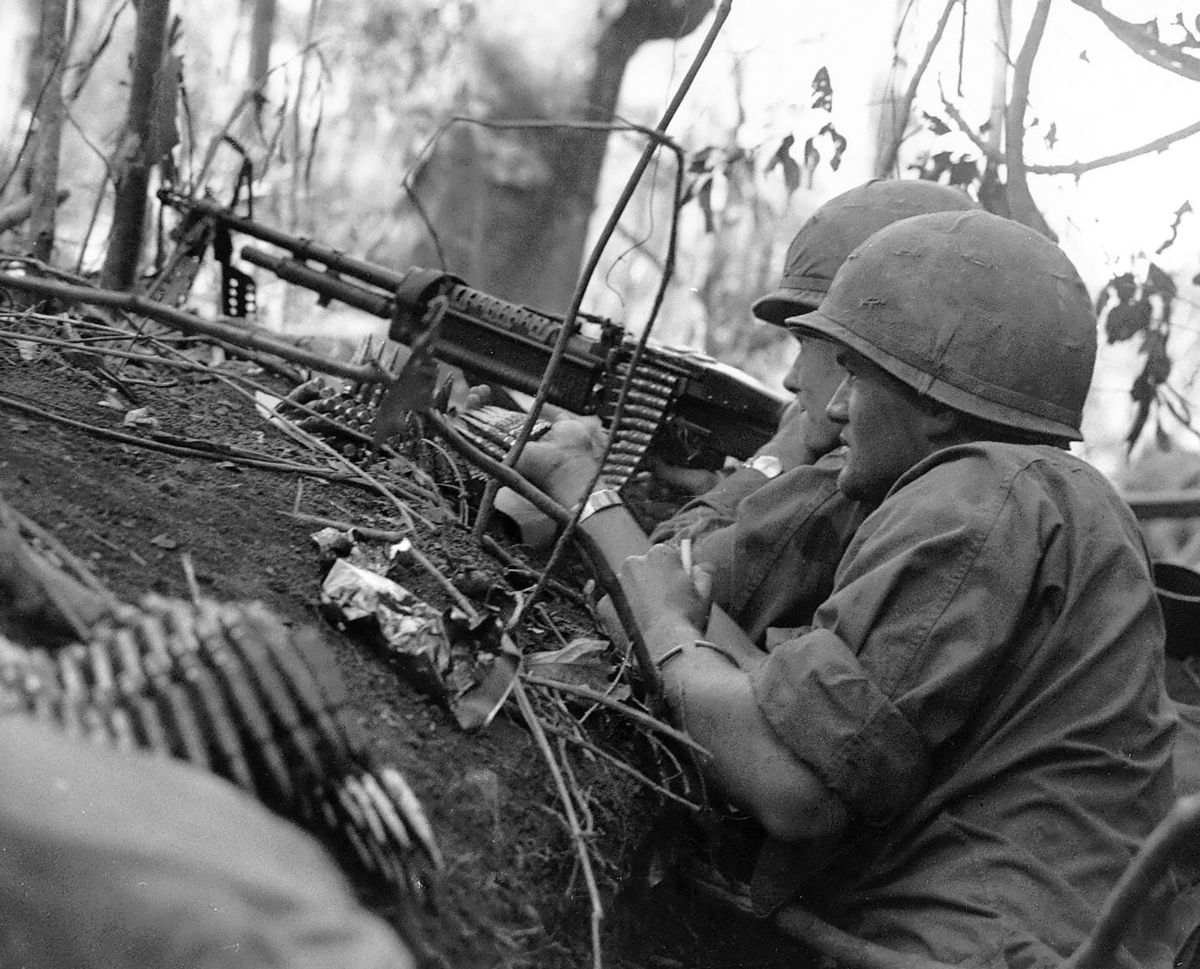 I was opposed to the Vietnam war; two of us got massively drunk watching in horror the landslide Coalition victory in the 1966 Federal election. I never marched; I worked for the Army; I examined young men for acceptance into the Vietnam War carnage; I silently protested; one night left on my own when my elderly companion examining doctor was indisposed, I failed everyone. Maybe I saved them from a conscripted life – or death – and the destructive mental aftermath of those soldiers I saw who presented at my regular morning clinic in the Victoria Barracks.
I was opposed to the Vietnam war; two of us got massively drunk watching in horror the landslide Coalition victory in the 1966 Federal election. I never marched; I worked for the Army; I examined young men for acceptance into the Vietnam War carnage; I silently protested; one night left on my own when my elderly companion examining doctor was indisposed, I failed everyone. Maybe I saved them from a conscripted life – or death – and the destructive mental aftermath of those soldiers I saw who presented at my regular morning clinic in the Victoria Barracks.
Arrogant? I never regretted that night; still don’t.
We went to a vibrant, unified Vietnam in 2022, which just emphasised what a useless waste of life it had been all round. The Americans just destroyed in the name of their disposable society in the thrall of the Satanic Kissinger.
I hope the blokes I failed have had a good life, whoever and wherever they are now.
Pomegranate
A garden in closed is my sister, my spouse; a spring shut up, a fountain sealed.
Thy plants are an orchard of pomegranates, with pleasant fruits; camphire, with spikenard,
Spikenard and saffron; calamus and cinnamon, with all trees of frankincense; myrrh and aloes, with all the chief spices:
A fountain of gardens, a well of living waters, and streams from Lebanon. – Song of Solomon 4: 12-15
Over the years, I have become obsessed by the pomegranate. To me the pomegranate is associated with the medical profession. Many of the medical colleges, societies and associations have the pomegranate as part of their heraldic symbolism. Of more recent relevance, the pomegranate was chosen as the logo for the Millennium Festival of Medicine in 2000.
The pomegranate has been ascribed many positive health effects, and if they are believed, a pomegranate a day would keep the doctor at bay, but I want to plant pomegranates in my garden, in honour of one of most loyal, quixotic doctors I have ever met. He was a Pom. He died last year – and I promised his wife I would dedicate a patch in the garden to growing pomegranates in his honour.
Not that we have not tried to grow a couple once, but they were planted next to the Gymea lily, and failed to thrive. The Gymea Lily eventually grew its characteristically long stem topped by the bunched red flowers. It collapsed and now it is about to be removed. These new pomegranates, hopefully a metre in height will thrive, and maybe I’ll see them fruit.
It is a pity that the French word for pomegranate “grenade” has such a destructive connotation in the English language; hardly off set by its juice – grenadine – being provided for cocktails, the tequila sunrise being one – but it is a bit cloying for my taste.
Now I want to see pomegranates planted in my old university college. Maybe they will; maybe they won’t. We lost another doctor colleague, three years older than myself, who I knew from our time at university and afterwards and respected. Never a close friend; I fear that I was too unpredictable for a guy who under his affability had a strict etiquette. Nevertheless, his death was the stimulus for such an idea, where those who had been privileged to be doctors could quietly contemplate.
After all, pomegranates are an ecumenical fruit – their glistening red seeds seen as some elixir. They are revered in many religions, even down to supposed 613 seeds in each fruit, which to Jews symbolises the righteousness of the 613 commandments in the Torah.
 For a secular state, it is easy to dismiss such statements, but my wish would be that pomegranates grown in the College be given each year at a Chapel service as an appropriate beneficence. Unfortunately, harvest time for pomegranates in Australia does not coincide with the Feast of St Luke in October – the patron saint who guides the compassionate skilful hand. To which we respond looking into the copse of pomegranate trees.
For a secular state, it is easy to dismiss such statements, but my wish would be that pomegranates grown in the College be given each year at a Chapel service as an appropriate beneficence. Unfortunately, harvest time for pomegranates in Australia does not coincide with the Feast of St Luke in October – the patron saint who guides the compassionate skilful hand. To which we respond looking into the copse of pomegranate trees.
Almighty God, who calledst Luke the Physician, whose praise is in the Gospel, to be an Evangelist, and Physician of the soul: May it please thee that, by the wholesome medicines of the doctrine delivered by him, all the diseases of our souls may be healed; through the merits of thy Son Jesus Christ our Lord. Amen.
And maybe don’t forget the Tequila Sunrise in yon chalice.
The Dutton Verbal
Gina Rinehart has abandoned Barnaby Joyce; and moved her considerable fortune onto another target, Peter Dutton. Dutton is a Queensland copper through and through, who has himself over the years become independently wealthy. He is just the interim leader of an unstable coalition, but luckily happens to come from a State where the hayseed has invaded his Liberal contraption. He would have no hope of being the leader if he happened to have been hatched in the Southern states.
Dutton stands in the succession at the end of a string of NSW Prime Ministers, each worse than the one before. Shunned, eventually, with the Coalition in opposition he became the leader of an exhausted low-level Party, savaged by the appearance of a group of intelligent women called “teal”, who remained unperturbed by the mud slung by the gang of Murdoch misogynists.
Dutton is verballing Australia with his asinine concepts, and as such because he seems oblivious to ridicule, he keeps in that dark voice monotone, showing no emotion – just repeating simple false assertions.
He knows only too well, that belief in science has been broken – the years of scholarship cast down the drain of superstition. It is a cynical exercise, because I do not see Dutton cloaked in an animal fur gnawing away at the bone marrow of a mammoth cut from the Bowman tundra. Even he accepts the accoutrements of progress.
However, his low affect contrasts with the squeals of an unsettled Prime Minister without the intellect to engage in personally dismantling this erstwhile Brisbane copper. Dutton will keep on verballing, carpeting the countryside with assertions and letting his jester, O’Brien, cop the derision. After all, it takes a certain style to lose your seat to Clive Palmer as O’Brien did in the 2013 Federal elections.
Dutton realises very clearly that to get elected, he must disrupt and incite uncertainty in his calm, lugubrious way, with a claque of Gabriele D’Annunzio aligned Futurists to help him unsettle the Australian political process (I do not necessarily believe that Dutton has ever heard of Futurism but having the instinct to ferret around helps him in a similar dialectic)

Dutton knows that Albanese is fatally flawed in his indecisiveness and his tendency to tantrums. It is easy to make Albanese look weak, hence the ad hominem barrage Dutton has recently started to unleash. Just an extreme form of verballing. Whether the appointment of Matthew Kean to head the new Climate Change Authority will change the dynamic is unknown? I doubt it as Dutton now has another target to verbal, Master Kean. I have just been reading about the antics of the French king, Charles the Bald, in the fourteenth century. Dutton would feel at home.
If the Kean appointment stops the Government from wringing its hands, ignore the Rinehart capacity to pay everyone off, and seriously press the case for “renewables”, then I’ll be suitably confounded. Rinehart is only mining what we all own, but such is the political supplication, she survives – well. Too well!
Unless the Government coherently silence the cacophony wrought by Dutton, it will make even the clear definitions of combatting climate change vanish under a layer of Dutton verballing bulldust. This will be heightened once Dutton assembles his set of nucleophilic scientists – after all, if the press labels somebody like Switkowski an expert, then next day the Murdoch press will bestow apostle status on one who has, let’s face it, a rather speckled career.
After all, Australia had to endure Philip Baxter, the British Ex-Pat chemical engineer and first Vice-Chancellor of the University of NSW, who coloured the scene radioactive and, as David Crowe reminded us in an article in the SMH, of promoting the folly to build a nuclear power station at Jervis Bay. In Dr Strangelove tradition, Baxter wanted to create a nuclear arsenal under cover of the power station. Prime Minister Gorton was keen on the concept, but when he was deposed the project died at the beginning of the 1970s when Prime Minister McMahon baulked at the cost; the idea was finally killed by Whitlam.
But then the Brits have form, using the Pitjantjara lands without Aboriginal permission, to test nuclear devices; and for good measure made uninhabitable the Monte Bello islands off Western Australia. Yes, Australia, the playground for British nuclear scientists.
 I’m afraid when all this happened you – Dutton – were locked in a pre-morula suspension, a shining speck in the Galaxy just waiting to emerge to grace our country’s demise.
I’m afraid when all this happened you – Dutton – were locked in a pre-morula suspension, a shining speck in the Galaxy just waiting to emerge to grace our country’s demise.
And remember, Australia, we do not have the water to cool the reactors. One reason for Jervis Bay was that it had abundant water, but that was a long time ago before the tinder dry South Coast burned. So much for an abundance of water, as Baxter had assured us. It would have been a catastrophic disaster had we had a nuclear power station engulfed by the bushfires of five years ago. But then, some people have no sense of history and its importance. They used to be called Futurists.
Mouse Whisper
My boss’s country aunt had an outside toilet. You went out of the kitchen into a narrow pathway lined by a wall, with a path winding up the toilet, the little weatherboard shack on the side of the hill at the back of the main house.
At night, there was no light, so one always had to take a torch. So, the story goes, my boss’s cousin, also John, went up one night in summer with a torch, which did not provide much illumination.
Having completed his business, he went to pull what he thought to be the chain. Unfortunately, in the darkness he pulled the tail of a tiger snake hanging from the cistern, but with enough force to detach it so it fell at his feet. It seemed to be as shocked as Cousin John was, because tiger snakes have a reputation of some hostility when disturbed. Instead of rearing to bite John, it slithered away under the door. John was thus able to pull up his trousers, making sure when fastening the belt that it was leather not tiger snake. Enough to make a poor mouse shiver.
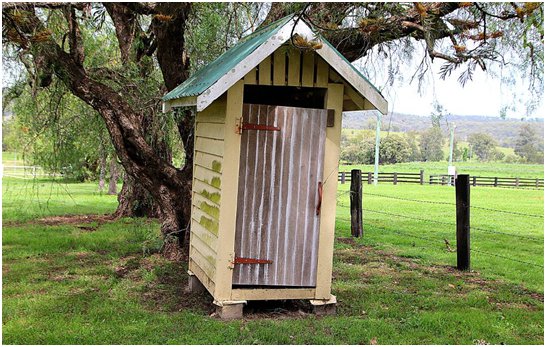

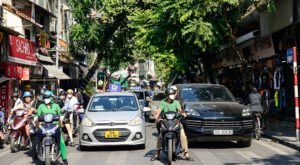
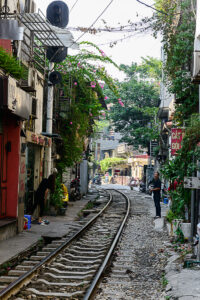

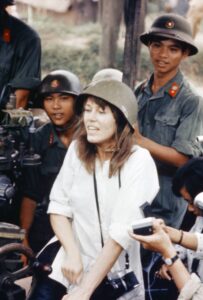 Jane Fonda remains on the Vietnamese screens in the garb of the anti-War heroine who visited Vietnam and was photographed behind a weapon designed to shoot down American planes. Never mind, that the installation was there to protect Ha Noi from the destruction being wrought by American aircraft – Ha Noi was carpet bombed, certain sections of Americans who were traumatised by the War exercise their God-given right to abuse her, even spit on her face with tobacco juice. She has apologised for her Ha Noi appearance, said she was sorry…
Jane Fonda remains on the Vietnamese screens in the garb of the anti-War heroine who visited Vietnam and was photographed behind a weapon designed to shoot down American planes. Never mind, that the installation was there to protect Ha Noi from the destruction being wrought by American aircraft – Ha Noi was carpet bombed, certain sections of Americans who were traumatised by the War exercise their God-given right to abuse her, even spit on her face with tobacco juice. She has apologised for her Ha Noi appearance, said she was sorry…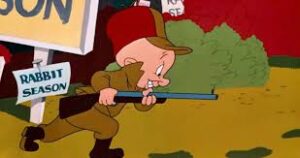 Hayek, all in one sentence – authoritarian, paternalistic, elitist. His book is an attack on democracy cloaked in academic jargon, I thought at the time, as I rolled over and watched the drifting birds. He offered no structure to replace democracy. Yet it took time to show neoliberalism to be an illusion, reaching its apogee in Donald Trump. In the meantime, be “vewy, vewy, vewy” afraid since Elmer Fudd is “vewy, vewy, vewy” likely to run for President in 2024.
Hayek, all in one sentence – authoritarian, paternalistic, elitist. His book is an attack on democracy cloaked in academic jargon, I thought at the time, as I rolled over and watched the drifting birds. He offered no structure to replace democracy. Yet it took time to show neoliberalism to be an illusion, reaching its apogee in Donald Trump. In the meantime, be “vewy, vewy, vewy” afraid since Elmer Fudd is “vewy, vewy, vewy” likely to run for President in 2024.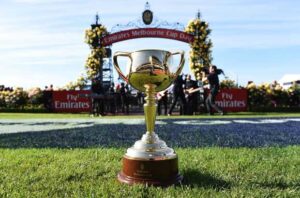 There we were on the South China Sea, and since the sea was a little rough, and balance is already a problem, I started to do some channel surfing. And there it was, unexpectedly, the 2022 Melbourne Cup being shown in real time. What other horse race would be shown on a French ship in Vietnamese waters. Not an Everest; nor a Kosciusko; not even a Wycheproof. Despite the huge amount of money which this guy V’landys seems to be able to fling on horse races for the benefit of Arab sheikhs and other deserving racing nobility, such as Lloyd Williams and the Waterhouses and their ilk. V’landys has, as far as I know, not arranged for his wonderful collection of highland flings to be shown in the South China Sea. And do not I think he would care a damn if they were ever shown – probably not.
There we were on the South China Sea, and since the sea was a little rough, and balance is already a problem, I started to do some channel surfing. And there it was, unexpectedly, the 2022 Melbourne Cup being shown in real time. What other horse race would be shown on a French ship in Vietnamese waters. Not an Everest; nor a Kosciusko; not even a Wycheproof. Despite the huge amount of money which this guy V’landys seems to be able to fling on horse races for the benefit of Arab sheikhs and other deserving racing nobility, such as Lloyd Williams and the Waterhouses and their ilk. V’landys has, as far as I know, not arranged for his wonderful collection of highland flings to be shown in the South China Sea. And do not I think he would care a damn if they were ever shown – probably not.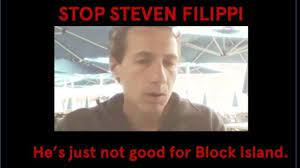 After a tumultuous summer during which his company temporarily lost its liquor and entertainment licenses after fights broke out at the venue and on the Block Island Ferry, Ballard’s Beach Resort owner Steven Filippi may have lost his unopposed bid for a town council seat.
After a tumultuous summer during which his company temporarily lost its liquor and entertainment licenses after fights broke out at the venue and on the Block Island Ferry, Ballard’s Beach Resort owner Steven Filippi may have lost his unopposed bid for a town council seat.